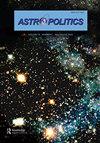Pakistan’s Journey into Space
Q3 Social Sciences
引用次数: 8
Abstract
ABSTRACT Despite political, technological, and economic constraints, Pakistan is considered an aspiring space power with a relatively modest space program compared to the larger, more successful ones of China and India. Innovative leadership, smart allocation of national resources, and political will are all necessary for any country to progress in such a high-technology field. The Chinese and Indian space programs pose unique challenges and opportunities for Pakistan. Rivalry with India over its regional and extra-regional ambitions means that Pakistan would have to give serious thought towards bolstering its space program as part of its national outlook in the twenty-first century. Pakistan can utilize cordial relations with China to improve its nascent space infrastructure through collaborative efforts to gain eventual self-sufficiency for socioeconomic and strategic purposes in the South Asian region. While Pakistan may not have the economic clout of a bigger power, it can utilize the “Space 2.0” concept of multilateral and public-private partnerships to empower its space program, enhance its domestic scientific and technological base, and build an indigenous space industry that can reap dividends at home and abroad. This can also benefit Pakistan’s needs to maintain strategic parity with India and stake its own claims as an emerging space nation.巴基斯坦的太空之旅
尽管受到政治、技术和经济方面的限制,巴基斯坦被认为是一个雄心勃勃的太空大国,与更大、更成功的中国和印度相比,巴基斯坦的太空计划相对温和。任何国家要在这样一个高科技领域取得进步,都需要创新的领导力、明智的国家资源配置和政治意愿。中国和印度的航天项目给巴基斯坦带来了独特的挑战和机遇。与印度在区域和区域外野心方面的竞争意味着巴基斯坦必须认真考虑加强其空间计划,将其作为21世纪国家前景的一部分。巴基斯坦可以利用与中国的友好关系,通过合作努力改善其新生的空间基础设施,最终实现南亚地区社会经济和战略目的的自给自足。虽然巴基斯坦可能没有大国那样的经济影响力,但它可以利用多边和公私伙伴关系的“太空2.0”概念来增强其太空计划的能力,增强其国内科学和技术基础,并建立一个可以在国内外获得回报的本土太空工业。这也有利于巴基斯坦保持与印度的战略平衡,并作为一个新兴的太空国家提出自己的主张。
本文章由计算机程序翻译,如有差异,请以英文原文为准。
求助全文
约1分钟内获得全文
求助全文
来源期刊

Astropolitics
Social Sciences-Political Science and International Relations
CiteScore
1.20
自引率
0.00%
发文量
2
期刊介绍:
Astropolitics: The International Journal of Space Politics and Policy is a peer-reviewed academic journal. The journal is dedicated to policy relevant and interdisciplinary analysis of civil, commercial, military, and intelligence space activities. Committed to the highest editorial standards, Astropolitics is the international journal of choice for the academic, policy-maker and professional in the space community.
 求助内容:
求助内容: 应助结果提醒方式:
应助结果提醒方式:


